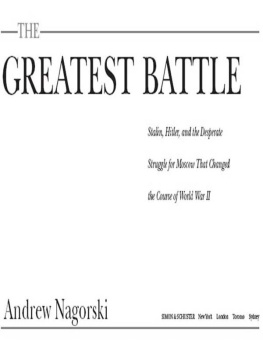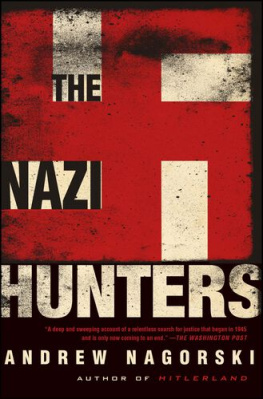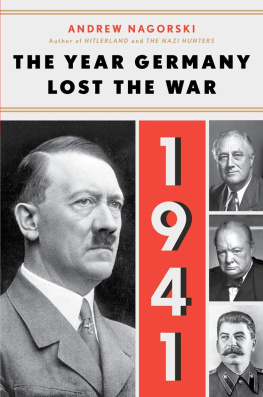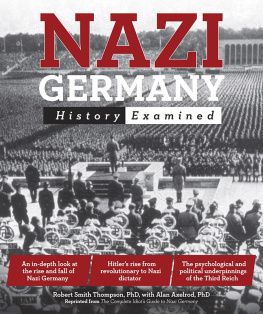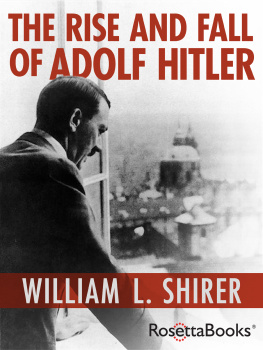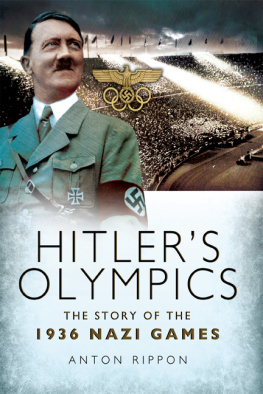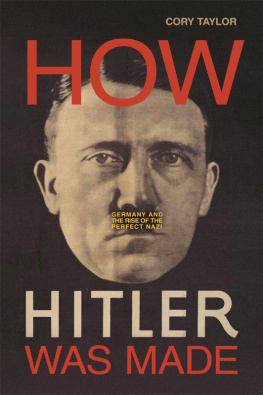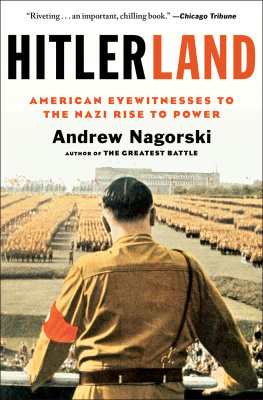Andrew Nagorski
HITLERLAND
American Eyewitnesses to the Nazi Rise to Power
For the youngest generation,
Christina, Kaia, Maia, Charles, Sydney, Caye, and Stella,
And, as always,
For Krysia

Of all the Americans who reported from Germany between World War I and World War II, no one was quite as well prepared for the assignment as Sigrid Schultz. Born in Chicago in 1893 to parents who had come from Norway, she spent most of her youth, starting at age eight, in Europe. Her father was a successful portrait painter who made Paris his base, which meant Sigrid attended French schools. When he received an assignment to paint the portrait of the king and queen of Wrttemberg, she also attended German schools for several months, equipping her not only with the language but also with early insights into local attitudes.
Few foreign painters were invited to German courts in those days and the other little girls tried to be nice, she recalled. But it was clear that to be non-German was a deficiency. Any foreigner who failed to be dazzled and humbled by German Kultur or efficiency was, at best, an object of pity.
Schultz studied international law at the Sorbonne and then moved to Berlin with her parents. There, she witnessed World War I from the losing side. Once the United States entered the war in 1917, she and her parents had to report every day to the police as enemy aliens, but she was able to continue her studies, taking courses at Berlin University. In the aftermath of that conflict, the Chicago Tribune hired her to work with its Berlin correspondent Richard Henry Little, who was impressed with her language skills. But from the moment she started her new job in early 1919, she demonstrated her reporting skills as well, teaming up with Little on assignments.
Together, Schultz and Little interviewed dozens of German officers to get a sense of their mood in the wake of Germanys defeat. Most were bitter, but none more so than a sour, disagreeable little man in navy blue, whose name was Raeder, Schultz wrote. The German officer told the two reporters: You Americans need not feel proud of yourselves. Within twenty-five years at the latest, your country and my country will be at war again. And this time we shall win, because we will be better prepared than you will be.
The Americans didnt take offensequite the contrary. I well remember how, on that day in 1919, we felt sorry for vengeful little Raeder, Schultz noted. He was taking defeat so hard. He was, we felt, simply consuming himself with hatred.
Schultz became the Chicago Tribunes chief correspondent for Central Europe in 1926, and she remained based in Berlin until 1941, impressing successive waves of the otherwise almost all-male American press corps with her knowledge of Germany and her tenaciousness in chasing down stories. Looking back at her experiences in her book Germany Will Try It Again, written and published during World War II, she argued that Raeders bitterness was widely shared by his countrymen, along with his eagerness to avenge their defeat in the previous global conflagration.
By that point, of course, she knew where this bitterness had led, and the question arises whether some of her descriptions were colored by hindsight. But in the case of her recollection of the interview with Raeder, it appears that she only added a final flourish to emphasize the accuracy of his prediction: When, almost twenty-two years later, Adolf Hitler declared war on the United States, the man commanding the German Navy was Grand Admiral Dr. Erich Raeder.
Much has been written about Americans in France and Great Britain during the interwar period, and even a fair amount about Americans in the Soviet Union. But, for a variety of reasons, the Americans who lived, worked or traveled in Germany at the time when Hitler was coming to power and then forged the Third Reich havent attracted anything like that level of attentionincluding Schultz and many of her colleagues. In fact, they are often forgotten. Or, like diplomat George Kennan, they may be remembered, but not for their German experiences; the German chapter in their lives was eclipsed by other parts of their biographies that made them famousin Kennans case, as the architect of the containment policy that successive postwar presidents pursued in dealing with the Soviet Union.
As a result, Americans often have the impression that the collapse of the Weimar Republic and the subsequent rush to terror and war took place in a strange, isolated country. Few of them pause to ask who were the Americans there who witnessed these events firsthand, how they perceived and reported them either as part of their jobs or simply as curious visitors, and what kind of impact their accounts had on their countrymens views of Germany at the time.
Today, its conventional wisdom that Hitlers intentions were perfectly clear from the outset and that his policies could only result in World War II and the Holocaust. Most people find it hard to imagine that in the 1920s and right through the 1930s, American reporters, diplomats, entertainers, sociologists, students and others living in or passing through Germany wouldnt have all instantly seen and understood what was happening before their eyes. After all, they had ringside seats, providing them with an unparalleled view of the most dramatic story of the twentieth century. Several of them not only observed Hitler from afar, but met and spoke to him, both when he was still a local agitator in Munich and then the all-powerful dictator in Berlin. To them, he wasnt some abstract embodiment of evil but a real-life politician. Some Americans tried to take his measure very early, while others did so once he was in power. And even those who didnt have those opportunities witnessed the consequences of his actions.
Yet their readings of what was happening in Germany, and what Hitler represented, varied greatly. There were those who met Hitler and recognized he represented almost a primeval force and possessed an uncanny ability to tap into the emotions and anger of the German people, and those who dismissed him as a clownish figure who would vanish from the political scene as quickly as he had appeared. There were those who, at least initially, viewed him and his movement sympathetically or even embraced it, and those whose instinctive misgivings quickly gave way to full-scale alarm, recognizing that he was a threat not only to Germany but also to the world.
It wasnt just Americans who didnt know what to make of Hitler or who hadnt really examined what passed for his worldview. Otto Strasser, an early follower of Hitler who later broke with him and escaped from Germany, recalled a dinner with several top Nazi officials at the 1927 Party Congress in Nuremberg. When it became apparent no one had read Hitlers autobiographical screed Mein Kampf in its entirety, they agreed that they would ask anyone who joined them if he had done soand stick that person with the bill. Nobody had read Mein Kampf, so everyone had to pay his own bill, Strasser reported.
The unfolding of history only looks inevitable in retrospect, and the judgments of the Americans who were witnessing these events unfold were based on a variety of factors: their predispositions, the different slices of reality that they observed and whether at times they saw only what they wanted to see, whatever the signals to the contrary. Schultz chose to highlight Raeders comments in 1919 to bolster her thesis later, once the United States and Germany were at war again, that Hitlers movement was the logical outcome of the hate fomented by the countrys defeat in the previous war. But other Americans dwelled on their warm reception in the aftermath of World War I, and wanted to believe that the toll of that conflict had been so high that it had served as a decisive object lesson. Edgar Ansel Mowrer, the Berlin correspondent for the rival Chicago paper, the



